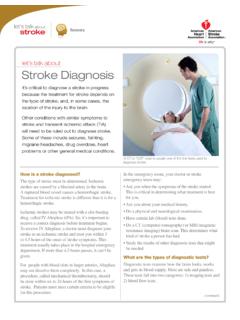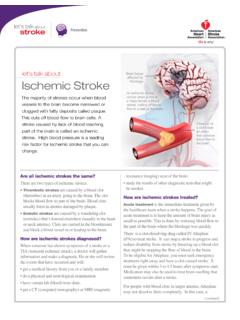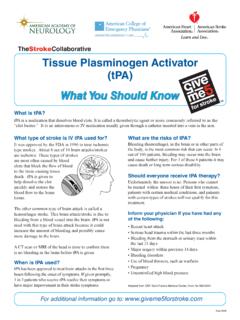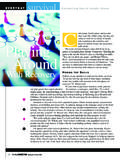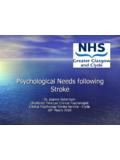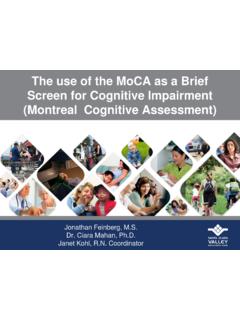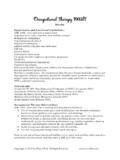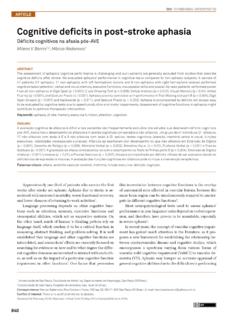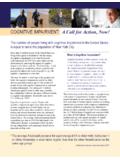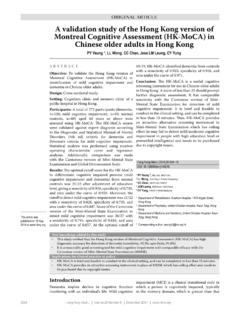Transcription of Caregiver Guide to Stroke - Stroke Association
1 Caregiver Guide to Stroke Practical tips and resources for new caregivers 2 Table of Contents Introduction .. 2 Emotional Support .. 3 Medical Management .. 5 Effects of a Stroke .. 7 Legal, Financial and Health Coverage 101 .. 9 Introduction Stroke recovery can be difficult and confusing for the survivor and the Caregiver . This Guide is meant to help you, the Caregiver , better navigate th e recovery process and the financial and social implications of a Stroke . We ve provided you with tips on how to communicate with the healthcare team and manage the effects of a Stroke , as well as information on legal resources, financial support, and health coverage.
2 To learn more about Stroke , visit For caregiving or general Stroke inquiries, please contact 3 Emotional Support Shock, helplessness and worry are common emotions for Stroke survivors and their loved ones. Immediately after a Stroke , it s not unusual to feel overwhelmed, fearful and uncertain about your new role as a Caregiver . These emotions may be a result of your loved one s severely limited physical functioning and personality changes. You may also fear that he/she will have another Stroke and that it s your duty to help prevent it. Your relationship with your loved one has also been altered.
3 In addition to your previous responsibilities, you may have to take on more household chores and other tasks that your loved one handled. To help you adjust to your new responsibilities, this section will help you find the emotional care and support you need from your community, family and friends. Get Informational Support By increasing your knowledge about what a Stroke is and what to expect, you can feel more in control and less overwhelmed. Ask questions. What type of Stroke did your loved one have? What side ofthe brain was affected? What caused the Stroke ? How can another Stroke beprevented? Learn about Stroke .
4 To start, visit Download andlook through our free Life after Stroke resources to learn more aboutspecific questions you have right now. It is important to learn the signs andsymptoms of a Stroke in case another one occurs. To learn the signs ofstroke, go to Learn about the effects of Stroke . Find out more about Stroke and what toask the healthcare Seek additional information on caring for a strokesurvivor. Call 1- 888-4- Stroke (1-888-478-7653) torequest the Resources for Stroke Family caregivers Packet. Talk with someone who understands. If you areseeking additional support or just need to talk tosomeone about your questions or concerns, call theStroke Family Warmline at 1- 888-4- Stroke .
5 TheWarmline is staffed by specially trained representativeswho have had personal experiences with Support From Others Reach out to family and friends. Talk to your familyand friends about what you are experiencing. Visits,phone calls, e- mails or some shared time at a movie orrestaurant can go a long way to help you feel supported,rejuvenated and refreshed. Build a network with other Stroke survivorsand caregivers . Stroke Connection magazine provides informationand inspiration to Stroke survivors and print and online magazine includes conditions thatmay lead to Stroke , such as high blood pressure, aswell as the physical, c ommunicative and behavioralconditions Stroke may cause.
6 It also offers tips for dailyliving and helpful information for family caregivers . Join the Support Network. Recovering from a Stroke ,or caring for someone who is, can be an emotionalexperience. Being there for each other is why we velaunched a virtual support community for Stroke andheart disease survivors and their families. The online Support Network also houses all the toolsand resources needed to start an in-person supportgroup, including train-the-trainer materials for groupleaders, checklists for building groups and evensample agendas for meetings. We invite you to joinus! Find encouragement and inspiration, or offer yourown words of wisdom.
7 Go to Consider seeking professional help. Mental healthprofessionals and pastoral counselors can listen to yourquestions and concerns while teaching you coping skillsto help you understand and better address your Logistical/Active Support Providing care for a Stroke survivor can be rewarding. But it can be stressful and frustrating when you re suddenly thrust into the role of Caregiver . Even under the best circumstances, caregiving is a tough job. In fact, it is among life s most challenging roles. There s often little rest and little time to prepare. If you ve just become a Caregiver , keep this in mind: To be successful, you must t ake care of your needs as well as those of the survivor.
8 Define exactly what you need. Don t hesitate to ask forhelp with grocery shopping, meals, doctor s visits, yardwork, etc. Write down the things that are most difficult for youto get accomplished and look for the right personfor the job. Then ask that person to help you with aspecific task. Consider seeking professional healthcare services. Ifyou are unable to care for him/her or would like help, visitAARP s Care Provider Locator. If you re consideringlong term care, use AARP s Long-Term CareCalculator to estimate costs. Seek respite care. For resources in your area, visit or call1- 800-677-1116. Or use the National Respite CareLocator at Time for Yourself Eat a balanced nutritious diet.
9 Learn about how youcan maintain good eating habits and can help preventstroke and heart disease. Get regular physical activity. Find time to do at least one hobby once a week. Spend time with your family and friends. Start a journal. Journaling can help you relieve stress,organize your thoughts and spend time by Resources Rx for caregivers Caring for a Survivor with Aphasia Mindfulness Meditation for Caregivers5 Medical Management Communicating with the healthcare team can help you understand what happened during your loved one s Stroke , what to expect during the recovery process and how to help him/her recover.
10 As a result, you can feel less stressed and overwhelmed. Provide the Healthcare Team With a Thorough Medical History Information to share with your healthcare team may include: Past illnesses and/or diseases Medications Family history Previous surgeries AllergiesAsk Questions What type of Stroke did he/she have? (large vessel, small vessel, ischemichemorrhagic, etc.) What side of the brain did the Stroke occur? What caused the Stroke ? What risk factors may have contributed to having the Stroke ? (high bloodpressure, cigarette smoking, atrial fibrillation, etc.) How can another Stroke be prevented? What is the likelihood of having another Stroke ?
